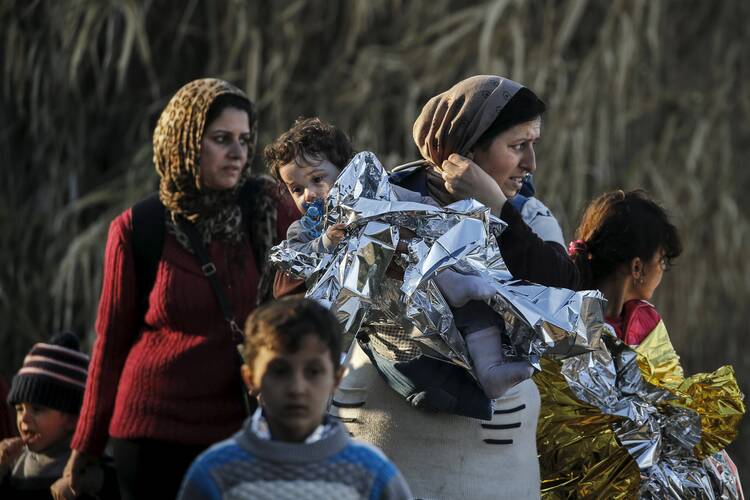Rome—In modern times, the “life for life, eye for eye” rule is seen by many as archaic, outdated and even barbaric. Yet with its recent controversial accord with Turkey, the European Union has imposed a “one-for-one” deal that applies the rule quite literally. As Pope Francis visits the Greek island of Lesbos to directly confront the refugee emergency there, let us hope his presence is not only a symbol of hope for refugees but also an opportunity to convince governments to fulfill those hopes and live up to the higher law to “love thy neighbor.”
Governments seem to fear that there are only so many human rights to go around; they are terrified of tampering with the invisible human rights equilibrium. For each person’s rights granted, another must be denied.
The E.U.-Turkey deal—through which Europe will accept one Syrian refugee from Turkey for every “irregular migrant” pushed back from Greece to Turkey—treats human beings like bargaining chips. The accord, which simultaneously grants visa-free travel to Turkish citizens and progresses Turkey’s E.U. membership negotiations, restricts one group’s freedom of movement while ensuring another’s.
There is a paradox, however. By making “one-for-one” trades, the E.U. suddenly becomes the captain of the playground sports team, carefully picking and choosing its favorite “ones”—Christians over Muslims, Syrians over Somalis, “this one” over “that one.” In a system like this, people are not considered equal; but more than that, people are not even considered people. Therein lies the root of the problem: Refugees are human beings deserving of dignity, not “ones,” and their cases should each be fairly heard.
Thomas Smolich, S.J., international director of Jesuit Refugee Service, told it straight:
By choosing to be on Lesbos, [Pope Francis] is quite explicitly saying, “what Europe is doing right now is wrong.” To make Greece this sort of holding box for people who want to come—for lack of a better word—treating migrants and refugees like cattle, like commodities to be traded back and forth across borders, is wrong…and also to let people have to make this trip across the seas when there would be better ways to welcome people in a more structured fashion which would give people hope of actual safety.
The collectivism of recent E.U. policies is unfortunately an exclusive collectivism, ending at its borders, as is exemplified by mass expulsions, detentions and “one-for-one” cherry-picking policies toward refugees. But the pope’s words and the wider church’s message to “love thy neighbor” says that we do not get to pick and choose who gets to be part of the collective. Rather, we are—above all—part of one large collective called humanity, from which we cannot exclude people, especially those fleeing for their lives.
“All of us together, Muslims, Hindus, Catholics, Copts, Evangelical [Protestants] brothers and sisters—children of the same God—we want to live in peace, integrated,” Pope Francis said in his homily last month.
Since his inauguration, Pope Francis has been an outspoken social and political advocate for acceptance, diversity and hospitality toward refugees and migrants. He has encouraged religious communities and average citizens to welcome refugees into their homes. He has washed the feet of Christian and Muslim refugees alike.
On his first visit outside of Rome to the island of Lampedusa in 2013, the pope condemned the “globalized indifference” to the plight of refugees. It is time to change that indifference. “We can no longer take the suffering of others for granted,” he said in a message for this year’s World Day of Migrants and Refugees. We must come together and mobilize our compassion to make a globalized difference. It is the role of each one of us to pressure our leaders and institutions to ensure those who have lost their homes do not lose their hope due to xenophobic Western policies.
The church has a wider definition for “refugee” than most states. It recognizes that there are many other people in need of protection—victims of misguided economic policies, natural disasters, internal displacement, etc.—who do not fit into the Geneva Convention’s narrow definition of a refugee. We have a responsibility to provide protection for all those in need, not only those who meet our specific standards.
According to Cardinal Antonio Maria Veglio, president of the Pontifical Council for the Pastoral Care of Migrants, the pope’s visit will “reaffirm the importance of fraternal responsibility, looking into the eyes of people who are fleeing, whose fate is often decided by cynical agreements which ignore the real reasons behind their tragedy.”
Pope Francis is not only a religious leader but a European head of state. Hopefully other European leaders hear his message in Greece and follow suit to protect refugees by considering cases for asylum on an individual basis and providing safe and legal pathways to Europe, rather than detaining and expelling desperate people. It is time to make put these dehumanizing policies in the past in order to move humanity forward.
Jacquelyn Pavilon is the international communications coordinator for Jesuit Refugee Service.








